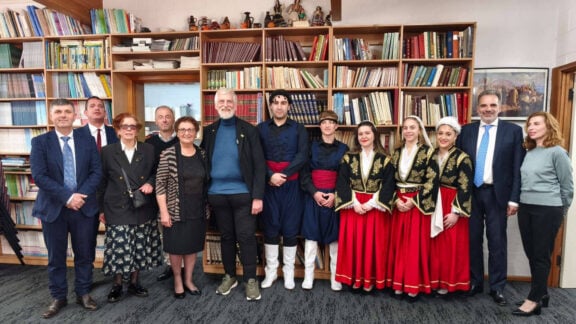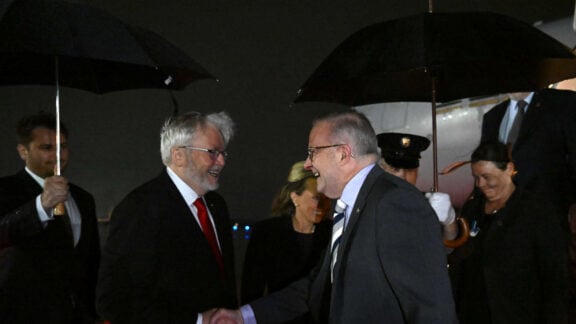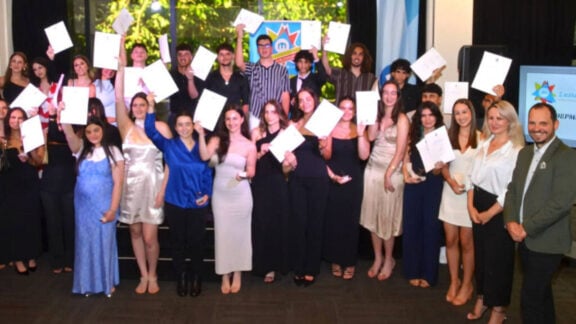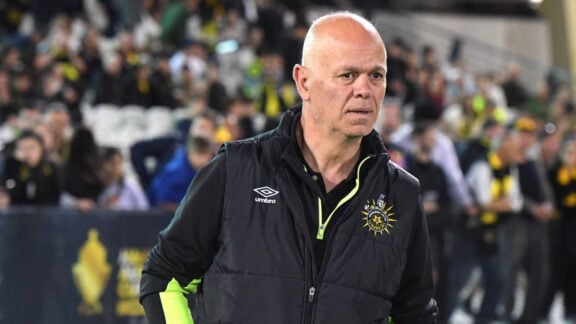You would not have thought Australia was amidst an election last Saturday night, as over 250 people packed The Wheeler Centre to hear Supreme Court Judge Emilios Kyrou in conversation. The event – a collaboration between the Antipodes Festival and Food for Thought Network – allowed Justice Kyrou to discuss identity, culture and racism through his eyes, drawing on life experiences represented in his book Call Me Emilios.
“By asking people to call me Emilios, I reclaimed my identity. This was an important step along the path of acknowledging – and later embracing – my Greek heritage,” said Justice Emilios Kyrou on the night.
The book traces not only his family’s history, it also reveals the shared hardships faced by an entire generation of Greek migrants, and how those adversities motivated those Greeks to succeed in Australian society. What is echoed throughout the book is the desire to maintain culture and preserve connections to heritage.
Founder of the Food for Thought network Varvara Ioannou introduced the guest speaker of the night, assuring everyone present they were in for a treat as they were going to hear from “one of Australia’s rare and precious diamonds”.
Olyvia Nikou QC, co-chair of the Advisory Board of the Contemporary Greek Cultural Centre said on the night, “there is a wind of change blowing in the Greek community of Melbourne in the cultural sector in collaboration with the leading of the spirit and art of the wider Australian community”.
During his talk, Justice Kyrou revealed more to the audience than what was written. His was a time when racism was rife in Australia – a time when he had to change his name to assimilate. A time when he always felt ‘different’ to the rest of the children. But the only time he felt at peace, he felt he belonged, was at Greek school. He said that Greek school provided so much more for him than just an education into his culture and heritage; it also provided a safe haven, a place where he could feel like he belonged.
“It was my refuge,” said Justice Kyrou on the night. At Greek school, he said, he was finally with his equals. “Our language is a key component of our cultural heritage, and learning it has benefits for everyone,” he said, imploring all second and third and fourth generation Greek Australians to send their children to Greek school; not just to learn the language and culture, but to feel like they too belong.
He grew up in a difficult time; extreme poverty and the ugly face of racism was felt as a daily occurrence of his young life. He said that the painful conditions he experienced only inspired him to work hard and strengthened his moral ethos that allowed him not only to become a successful lawyer, but further as Victoria’s first Greek Australian Supreme Court Judge.
Professor Nikos Papastergiadis, co-chair of the Contemporary Greek Cultural Centre Advisory Committee, moderated the evening, providing an all-important thread between speakers. Professor Papastergiadis also spent some time discussing issues of identity and cultural preservation, which arise in Call Me Emilios.
Conducting the Q&A with Justice Kyrou was Eyvah Dafaranos, wife of Greek Ambassador Harris Dafaranos – a poet in her own right. Moving through a number of questions about Justice Kyrou’s childhood and journey towards becoming a Supreme Court judge, the discussion raised issues of racism and discrimination, but also those of resilience and overcoming prejudice to succeed. Justice Kyrou is passionate about “sharing our parents’ and our own life experiences with our children and grandchildren, so that we can enrich their lives by giving them a deeper appreciation of their families, their culture and their roots”.
He also went on to emphasise “the importance of Greek Australians not being insular about their Hellenism. We must do more to establish links with organisations in Greece and Hellenic organisations in other parts of the world. Our view of Greece should not only be historical and holiday-focused but should be contemporary and vibrant”.
Melbourne writer and publisher Helen Nickas spoke about the significance of memoirs and the way they reveal histories and also retain cultural memory. She had this to say to second and third generations: “Please write your stories. You may not think they are interesting enough but, for history’s sake, they are.”
Call Me Emilios is available for $30 from the Hellenic Museum, Caras, the Law Institute Bookshop, Readings, the Immigration Museum and the Coop Bookshop as well as from the Food for Thought Network by emailing membership@fftn.org,au
Advertisement
Teach your children Greek
The conversation with Justice Emilios Kyrou revealed more than just the importance and significance of a name









